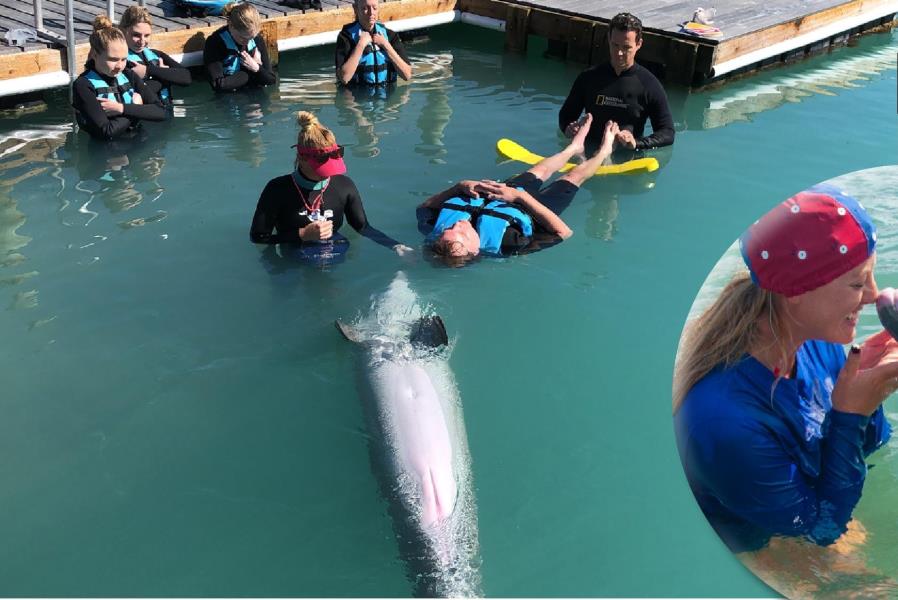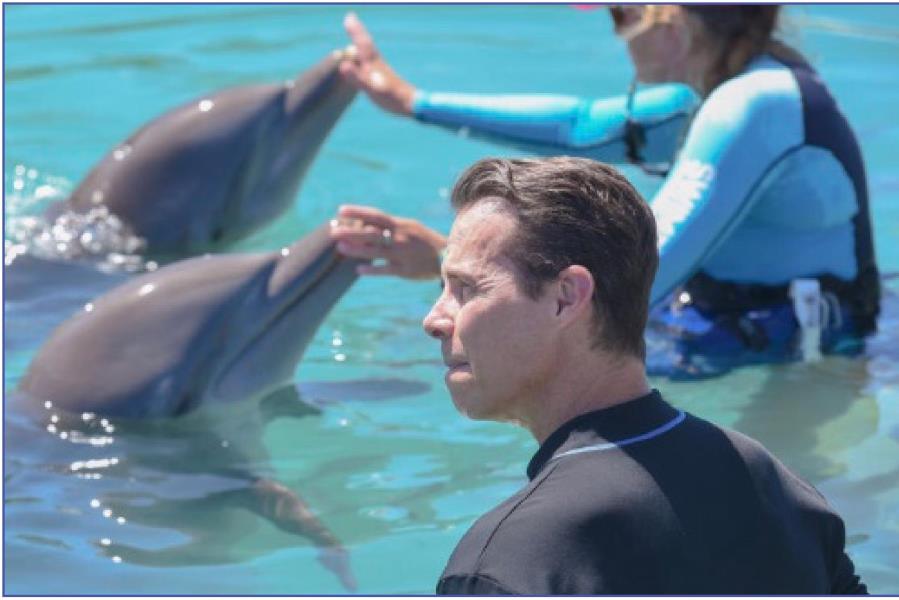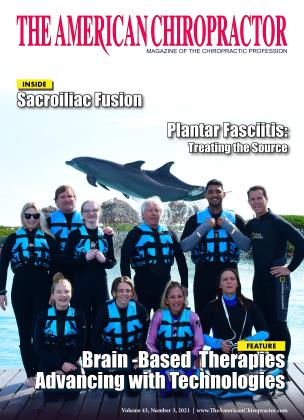“The experience is beyond words at times”
March 1 2021 Michael K. Bagnell, DC, DACNB, FABBIR“The experience is beyond words at times”
March 1 2021 Michael K. Bagnell, DC, DACNB, FABBIRCurrent research into the impact of chiropractic healthcare on the central nervous system is revealing unique changes in the brain. For decades, DC’s have had anecdotal reports of their clients reporting positive changes in mood, behavior, and attention. Recently, many of our chiropractic colleagues with advanced training in functional neurology have begun measuring aspects of brain activity that go beyond sensory-motor function including brainwave activity, cognitive abilities, and attentional metrics to document the changes possible with different applications within chiropractic and clinical neuroscience.
Chiropractic’s significant effects on the brain and the advancement of technology which measures brain activity came together in 2019 quite uniquely, as an opportunity to collaborate with dolphins and patients presented itself for Dr. Bagnell and his team in South Florida.
We used our opportunity working alongside these highly intelligent and empathic creatures to develop a combination of land-based (sensory-motor) and water-based (vestibular) activities. This opportunity turned into a five-day brain training camp for clients dealing with a variety of concerns such as post-concussion syndromes, ASD, immune issues affecting the brain including Lyme disease, PTSD, anxiety, depression. In a word, the camp is designed to increase brain resilience.
The brains of dolphins and humans show great overlap in neurobiology. “In 2017, a team of scientists in the UK and US at the University of Florida reported the discovery of pathological signs of Alzheimer’s disease in dolphins, animals whose brains are similar in many ways to those of humans1.” In the case of Alzheimer's, the two most relevant traits shared by dolphins and humans alike are greater longevity and blood sugar/insulin signaling which raise the risks significantly.
How did we come to include dolphins in our brain recovery process?
The collaboration between humans and animals for therapeutic benefits is extensively documented. Dolphins, dogs, and horses have been successfully integrated into environments where humans can gain benefit from direct contact with these wonderful creatures. Friends of ours involved with dolphin habitats around the world invited us to consider the possibilities of joining our brain-based applications with dolphins in the Florida Keys. After spending many hours with marine mammal specialists and dolphins in the water, we saw tremendous possibilities for people who seek our specialty. We developed specific brain-based activities that we could use playfully with the dolphins that bring joy to the participants in a targeted way. The water activities focused on vestibular integration, and often injured networks in TBI cases and targeted as the focal point in brain rehabilitation for many conditions.

My training in brain injury rehabilitation gave me greater insight into what these impacts can potentially lead to if not rehabilitated properly. Slower processing, lowered tolerance to stress, and impulsiveness have become important considerations in my health due to sports-related concussions. My father endured a severe TBI as a result of a car accident in the 70’s. His struggles and early dementia-related decline were an important warning sign to me regarding the significance of concussion/mTBI.
“With brain-based training, we have documented improvements in chronic pain, stabilized emotional health, and reduced sleep irregularities. Specific vestibular targeted activities, advanced neurofeedback approaches, oculomotor/vision specific exercises based on advanced technology, photobiomodulation(laser therapy), exercise and functional medicine optimization are components of our recovery programs that I utilize personally along with the unique experiences with the dolphins during our brain resilience camps in the Florida Keys. For many including myself, rehabilitation of the vestibular function has been absolutely essential in the effort toward recovery and resilience," stated Dr. Bagnell.
By measuring specific pre/post brain-camp metrics, we have built a body of documented changes in cognition, mood, attention, and memory that occur during the camp. We employ brain mapping technology, eye-tracking measurements, balance and stability scores, and other vital cognitive diagnostics. “Some of the most remarkable changes reported by clients during activities with the dolphins in which their echolocation senses were more active, appear to have significant effects on human physiology and brain function in reducing arousal states in the amygdala”, reported Dr. Bagnell.

The specific land-based activities which include vision training, cerebellar activities, neurofeedback, audio-visual entrainment, soft tissue applications, and chiropractic health care that began to create rapid changes in the sensorium of the participants. “The experience is beyond words at times”, according to a recent DC attending to improve his brain performance.
As technology and artificial intelligence (AI) continue to rapidly advance in the healthcare marketplace and extrapolate big data and its relationship from public health models (as in the COVID-19 crisis), the modern DC should consider adding technology to document functional measures and outcomes for brain network functions.
Being able to demonstrate improved outcomes and correlate effects to brain activity metrics we can gather pre/post therapy is a game-changer for our industry and perhaps even the reimbursement schedules of insurance carriers. Our profession has powerful tools at our fingertips to create changes locally and globally in the body, via mechanical and neurological modulation which may impact the patients' perception of their world, their mood, and intricate metabolic functions throughout their body.
About the Author
Dr. Michael K. Bagnell has achieved Diplomate status in Chiropractic Neurology and completed his Fellowship in brain injury rehabilitation. His brain-based healthcare approach blends the world of physical medicine with clinical neuroscience for the benefit of his clients. He practices in Pinecrest, FI., for over 31 years and teaches around the country on the implementation of a brain-based approach among his colleagues. He offers the Brain Camp with the dolphins in the Florida Keys on special dates throughout the year. For more information [email protected] or watch videos at the websitewww.bagnellbraincenter.com or directly to the office-305-259-8755CHelpDesk.com).
References:
1. https://news.ufl.edu/articles/...
2. (Filan SL, Llewellyn-Jones RH. Animal-assisted therapy for dementia: a review of the literature. 2006. In: Database of Abstracts of Reviews of Effects (DARE): Quality-assessed Reviews [Internet]. York (UK): Centre for Reviews and Dissemination (UK); 1995Available from: https://www.ncbi.nlm.nih.gov/b...)
3. Jasmin Jau, David Hodgson. (2018) How interaction with animals can benefit mental health: A phenomenological study. Social Work in Mental Health 16:1, pages 20-33.
4. Animal-Assisted Therapy with Farm Animals for Persons with Psychiatric Disorders: Effects on Anxiety and Depression: A Randomized (Controlled Trial Bente Berget, 0ivind Ekeberg, Ingeborg Pedersen &Bjarne O. Braastad Pages 50-64 \ Published online: 18 Feb 2011.
 View Full Issue
View Full Issue









